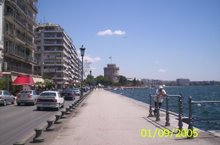Commentators have been quick to point out that Russia's defeat of Georgia has pretty much killed the chances that new oil and gas pipelines will be built to increase the security of supplies to Europe. It's clear that there is little to stop Russia from rolling its forces up to the existing pipeline or knocking it out of commission if it wanted to. The Washington Post's Steve Pearlstein even suggested that demonstrating the pipeline's vulnerability may have been one of the underlying motives for the Russian incursion.
The United States has been promoting the idea of pipeline routes skirting Russia as a way to promote European energy security, but the chances of making that work have always been slim. The reason: The United States has been simultaneously trying to keep Iran, the world's other major holder of natural gas reserves, out of world markets and out of alternate pipeline networks. Without the Iran card, it's very difficult to win a pipeline game against Russia.
The U.S. has long been pushing for oil and natural gas pipelines from the Caspian Basin that would bypass Russia, especially via Georgia. The current Georgia pipeline began in the late 1990s as a project to carry the estimated 35 billion barrels of oil, and natural gas, from the Caspian Sea area to European markets. One current line, the Baku-Tblisis-Cyhan line, runs through Georgia and then on to Turkey's Mediterranean coast for shipment. Another oil line ends up at the Georgian port of Supsa, which the Russian navy blockaded. A proposed natural gas line, called Nabucco, would go through Georgia to Austria, reducing Europe's heavy dependence on Russian natural gas pipelines.
Was it ever possible for a non-Russian natural gas pipeline route from the Caspian basin to supply enough gas to free Europe from Russia's grip? Not likely given Europe's large needs. Moreover, Iran has perhaps the biggest natural gas reserves outside Russia, and the United States has been simultaneously trying to block any expansion of Iranian natural gas exports. It's hard to think realistically about supplying enough natural gas to the world without either of the countries with the biggest reserves.
One European oil company executive told me today that the Nabucco line, named after a Verdi opera, was simply "not a doable project because there is not enough gas to justify the investment" -- at least without Iranian gas coming into it. "The only thing that can make it viable is by using Iranian gas," he continued. Otherwise, he said, it is "pie in the sky." American policy makers, he said, "want to have their cake and eat it too. They want to keep Europe from using Russian gas and they want to keep Iran in a corner too."
Finally, if the United States is trying to marginalize Russia and Iran, that means a big role not only for the Caspian line but also for the capital-intensive liquefied natural gas projects in Qatar. Will Europe feel more secure by building a new natural gas dependency on the Persian Gulf?
Suddenly the pipelines that run through Georgia seem like just another facet of global energy insecurity rather than enhanced security. Oil and gas experts are fond of saying that energy security lies in diversity.
But especially when it comes to natural gas, achieving enough diversity of supply to feel secure may be impossible.
By Steven Mufson on August 19, 2008 6:27 PM




No comments:
Post a Comment